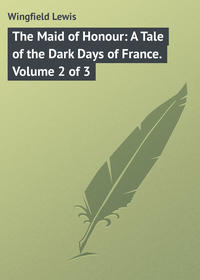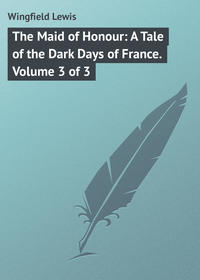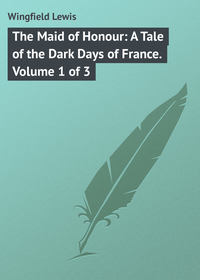 полная версия
полная версияMy Lords of Strogue. Volume 3 of 3
But His Excellency hated tortuous groping; he abhorred the Irish peers; begged that he might not be asked even to sniff the noisome broth. When he came over he attached to his person a young Irishman of parts, who was not squeamish. The chancellor had also shown that he was not squeamish. These two Irishmen-my Lords Clare and Castlereagh-must do all the broth-stirring; the sooner the brew was ready, the sooner they would receive their wages-the sooner would he, the Viceroy, be enabled to leave the wretched country and go home. Once the union carried, every one would be delighted-except the Irish; and even they, in due time, would come to be glad also. Lord Clare's eye kindled with satisfaction. He beheld the possibility, if this captious Viceroy would only depart, of himself returning to his former position. He saw himself again the awful statesman, before whom courtiers should salaam, as they used to do; he saw his ambitious vision (obscured for an instant) realised at last. There were only a few more yards of mud to wallow through before reaching terra firma, and then he would take a bath and, by dint of scrubbing, appear no more dirty than his fellows. So he made up his mind, as Lord Cornwallis declined to help, to manage the caldron in conjunction with Lord Castlereagh, and the pair were quite engrossed by the phases of their hellish cookery.
There was one matter that was hemmed round with grievous difficulties, which had not yet been settled, and which troubled every member of the Privy Council not a little. What was to be done with those leaders of the United Irishmen who were still awaiting trial at Kilmainham? What was to be done with Tom Emmett, Russell, Neilson-what with the arch-traitor Terence Crosbie? It was evident that a repetition of the fiasco of the other day must on no account be risked; they must not be tried. Neither must they remain at Kilmainham, for it was probable that they had relations with the outer world, that they were plotting still, and might possibly give more trouble by-and-by by organising a new Directory. There was no object now in allowing them to plot. On the contrary, once the union carried, it was essential that Ireland should be at peace. Lord Clare knew perfectly well, while he prated about peace, that he had wilfully hailed the silence of a cowed nation as a restoration of contented tranquillity. He knew very well that if the English army and the soldier Viceroy were removed, and the leaders permitted to scheme on, the country would be in as much danger as ever; that, union or no union, millennium could not supervene until time should blot away the nefarious means employed. What could be done with these dangerous conspirators? They could not be tried and executed; they could not be released, or kept in Ireland, or shipped to America. As white elephants, they daily became more cumbersome; it was a pity that gaol-fever would not take them off. But they were provokingly well, in spite of privation and suffering. Their wings must be cut somehow. Couriers posted to and fro between London and Holyhead, bearing despatches on this difficult point. While Lords Clare and Castlereagh were making final preparations for the union, Lord Cornwallis was striving to devise a plan which should not be too glaring an example of broken faith. He implored. He begged. He threatened. Good King George was as tractable as usual. The odious villains were either Papists, or Protestant defenders of Papists, which was worse. The apostasy of these Protestants was more grievous than the sin of Popery itself. They should receive no mercy. No compact with such rascals could be binding. He would not have them banished across seas, where they might achieve some measure of happiness. They must be kept in duress as scarecrows-an awful warning to other ruffians. There was no moving him. At last ministers gave way, and it being decided that the white elephants should be shipped to Scotland, commissioners were appointed to select a suitably unpleasant spot where they might languish without danger to the community.
There is a fortress on the extremity of a tongue of land which juts into the Moray Firth, the country round about which is destitute of houses or of trees-a dreary, forsaken desert devoid of vegetation. The very place! The obdurate ruffians should be transported to Fort George, as soon as it could be made strong enough to keep them safe.
Meanwhile the Viceroy was guilty of an act of politic clemency which would have put the King in a bad temper if he had known of it. He determined that, as several months must elapse before the fortress would be ready, it would be well to permit the arch-villain Terence to go home-on parole-provided he would give his word to plot no more. The circumstances of his reprieve were producing a profound impression in society. The romantic devotion of the servant-the imminent danger of the master-were so dramatic, that high-born dames regretted their absence from the moving spectacle. They professed to be vastly interested in a young man who could call forth such a proof of affection from another, and vowed that it was a shame he should be sacrificed. Sure, Moiley ought to be content with a nice hecatomb selected from the lower classes. Lord Cornwallis perceived that here was a good opportunity of paying the nobles a compliment. They were so important a factor in the matter of the union, that it was well to conciliate them as a body; and what better way was there of doing so than by treating one of their order with indulgence? He therefore intimated to Lord Clare that he was inclined to do what he might to please him-that he saw the mistake he had made in allowing Lord Glandore's brother to be tried-that he, Lord Clare, might, if he wished it, inform the dowager countess of a special favour that was in store for one of her known loyalty-namely, that she might expect to have the custody of her erring child until the time of his vanishing from Ireland.
Lord Clare was charmed, and hurried to Strogue with the good news. My lady was a riddle, whose behaviour was always different from what might be expected. He knew that Terence's danger had placed her on a gridiron where she was consuming slowly, and naturally concluded that her joy at his reprieve would culminate when she was told that she might keep him near her for a while. This extraordinary young man, for whom a servant would sacrifice his life, must needs be tenderly beloved by the mother to whom he owed his birth. If she was in raptures she had a queer method of displaying her feelings. Her cheek turned a shade more pale than usual. Bowing her head as under a new blow, she murmured, 'It is well.'
Though he knew and esteemed the countess, Lord Clare's acquaintance with my lady was not so intimate as ours. He had not seen her at Glas-aitch-é, when every chair and table was babbling of what had happened there. He did not look on her when with a spasm of self-reproach she discovered that the undoing of her second son would not be so heartrending as it ought to be. He did not know that in face of Terence's doom she was torn by two distinctly opposite emotions; that while his fate crushed her as a judgment for past sin, it also brought a sense of relief. He was not aware that with his death a burthen of long-endured apprehension would have been lightened, whereby her tortured soul might attain a semblance of rest at last.
We soon make up our minds to the inevitable. My lady had made up her mind that Terence was to die. Her pangs of conscience were bitter, but the dreadful thing was settled; no influence of hers could affect the youth's fate now, whatever it might have done in the past. So low was she fallen that she found some poor relief in that. But this new, unexpected freak of Fortune brought all the bitterness of her trouble back again; and with a sigh she roused her distempered faculties from lethargy and bestirred herself-for the dreary battle was, as it seemed, not over yet. The implacable phantom kept whispering in her ear that it was not too late even now to set right the wrong; that there still was time if she would force those stubborn knees to bend and abase her pride.
My lady loathed herself for the thoughts which held possession of her mind. When the chancellor brought his news, she concealed the sudden turbulence within. Strangely enough, the mother's sympathies, even at that moment, were not for Terence-the son who had escaped the halter-but for Shane; and a great fear for him leaped up in her heart, to the crushing out of natural feeling. Terence was snatched from the grave as by a miracle. A foreboding took strong hold of my lady's mind that this was for a purpose-that Heaven, not satisfied with the penance of a lifetime, was determined that she should blab out to the world the secret which, lying on her bosom, had seared her life. Oh! why did she not accept her punishment all those years ago, when the task would not have been so hard? The earth had been no pleasant place of sojourn to my lady. When she thought of all she had borne since the old lord's death-of the utter futility of the penance-she became rebellious, and gnashed her teeth at the simpering portrait of him who had got off so easily. She rebelled against the iron sternness of Heaven. She was to bend her proud knees, was she-and confess? Her whitened hair and ashen cheeks were not to be taken into account? Very well, then. She defied Heaven; religion was a delusion and a snare; the Lord of Heaven unduly just. Tossing her favourite tracts into the fire, she swore she would not be driven to speak, though the ruin of her soul should be the penalty. At the time when it was decided that Terence was to die, she spent the long hours in reverie over the past-in poignant regret that he should have to be thus sacrificed. She reflected that if she had spoken all those years ago he would never have joined the popular side-would never have risked his neck-of that she felt assured; and so she felt in some sort as though she had herself handed him over to the scrag-boy. It was an awful thought, and it had weighed down her intellect. But now came a revulsion. It was not to be so. He was to live as a reproach. Heaven was hounding her down, so she stood at bay. If Heaven had accepted the penance of a life without requiring that the original transgression should be cancelled by confessing it she would gladly have borne the penance to the end of a long weary existence. But that the penance should not be accepted in any way as an equivalent, was maddening to her sense of justice. She bestirred herself; sat no longer dreaming the days away. The household whispered that my lady was herself again, that the joy of her son's reprieve was accountable for the happy change. All thought this save Gillin, who knew her secret. That excellent person scratched her untidy head with a comb and pondered. What did the wicked old woman mean to do? There was more mischief brewing-of that she felt quite sure. Well, Terence was saved from the gallows by direct interposition from above. He was not intended to be made a sacrifice, any more than Isaac was when his father's faith was tried. A few months remained to him before he was to be taken to his Scottish prison. If my lady should allow him to go there, without making an effort to prevent it-why then she, Madam Gillin, would open her mouth and speak. Her lips had been closed over-long. Had she not sworn an oath beside that deathbed? It would become her bounden duty to interfere, if the countess lacked courage so to do.
It was touching that in moments of severest trial my lady should always have been engrossed by the interests of her black sheep. She always thought of Shane rather than of herself; and he gave her little satisfaction in return for this great love. Never very white, he was daily growing darker. One evil thought engenders another; one evil deed makes a second necessary: we were all taught that in earliest infancy, and Shane's condition was in accordance with the rule. His prowess in the past as King of Cherokees had brought him little blame in public estimation, for the Glandores had been fire-eaters time out of mind, and the Irish love a spark with mettle in him. But his conduct since he departed for Glas-aitch-é was on many sides disapproved as shady. The Viceroy openly showed his mean opinion of him. His tenants had protested by injuring his cattle and destroying his crops. He was proud, was Shane, as well as naturally reckless, and was fond of notoriety. He resented the Viceroy's treatment, and was furious with the tenants; and became more wrathful still with Terence, to whose ill-advised conduct he imputed his own growing unpopularity. What was the use of having mixed himself up in the odium of Tone's capture if his brother was to cut the ground from under his feet? It was but too probable that he might whistle both for an English peerage and comforting bits in the way of sinecures; and all because of Terence. Was it not enough to provoke a saint-much more an Irish earl, who considered himself a pauper? Lord Cornwallis was unkind and rude. My Lord Glandore complained of his uncivil treatment to Lord Clare. The chancellor, with an eye to business, soothed his amour-propre, and roundly told the Viceroy in private that he must constrain himself to be civil to the peers. Then he broke ground to Shane with reference to the union, explaining that he might put himself quite right if he would work with the executive in this matter. He must promise his vote in the House of Lords and all his influence in the Commons, and then his gracious Majesty would doubtless give substantial proofs of his approval. Shane promised that he would follow this worldly-wise advice. As my Lord Clare so cogently observed, the union was arranged-was to all intents and purposes a fait accompli. Lord Glandore's influence could not prevent the end, even if that peer should elect to be disinterested. What a lack of common prudence would he show then, if for a crotchet he should bar himself out of Tom Tiddler's ground! His brother's ruin showed the result of crotchets. There would be fine pickings. The Chancellor gave his word as to that, adding at the same time that the man is a fool who strains at gnats. Shane therefore was as easily talked over as many another of his order. Lord Clare was quite certain about the success of his project, but thought that it would perhaps be well to sound my lady in order that she might not through inadvertence undo his work.
Now, as we know, she had lived the life of a recluse, looking at political events, in most cases, through the chancellor's spectacles, half-awakened now and then by the diatribes of Mr. Curran. But she thought his web was a wicked piece of work when now he displayed its woof to her; and objected strongly to his design of mixing her firstborn in his scheming. It was grievous to her that the dear dark wool of the dusky sheep should be further blackened. My lady got rid of her importunate old friend by saying she would speak to Shane as to the using of his influence; and, left alone, sat wondering what she ought to do. It was a bitter thing to think of the proud name being held up to obloquy. Yet there were reasons why valuable titbits must not be refused idly by the idol of her heart. If only that old abortive project could be carried out! If only Shane was safely married to his cousin! Was it too late to make another effort? My lady perceived dimly that Shane was repelled by the damsel-and no wonder. The passions of this earth seemed gone, burnt away, consumed, by the action on her mind of past events. Doreen sat on a heap of ashes, enclosed in a rarified atmosphere of her own. But, for all that, another trial must be made; matters were becoming desperate; my lady began to fear that she was not strong enough to fight against Heaven. She would see Shane, and speak very seriously to him forthwith.
It was no easy matter now to get hold of Shane. Since his return to Dublin he had plunged deeper and deeper into excess-partly from having been mewed up so long, partly to drown the voice of the inner monitor, partly because of the forbidding chilliness of his own fireside and the presence there of his gloomy brother. The Blasters, who during the reign of terror had been busy with the triangles; the Cherokees, who had been dispersed about the country with their regiments, returned now to the capital, to sit for the last time in the Irish Parliament, by order of the chancellor; and glorious were the nights they passed together whilst awaiting the decisive moment. The hounds of Strogue were brought again into requisition. My lord and his boon companions amused themselves with cub-hunting-careering with wild shrieks across the land-past cabins, the shoulders of whose occupants were disfigured with livid weals-past huts whose inmates cursed the cavalcade as it swept by. They rode all day. They drank and fought all night. My lady had to bide her time in order to lay hands upon her son. Verily, it seemed little probable that his infatuated lordship could be induced, even by her entreaties, to pull up in full career for the sake of wooing the cousin who frightened him!
As though in furtherance of the unrelenting measures of Heaven, both sons were received now as guests at the Little House, and equally insulted their parent by making no secret of going there. The scraping of their feet was visible on the wall which divided the two properties. My lady could not but admit that Fate took pleasure in deliberately thwarting her arrangements. Why, when so many Catholics came to ruin in the Hurry, was this horrible woman allowed to escape scot-free? After she had been caught in the act, too, of harbouring traitors! Was it that through her (the only one on earth who had power to do so) the secret she kept so hungrily should be blabbed forth upon the housetops? Sure, a mark of Fate's finger could be detected here. But my lady was all the more determined to be obstinate. She would go on scheming, and wrestle with all her puny strength, shaking her broken spear-haft till finally put out of misery. If Fate was resolved to kill her, she would die hard, fighting to the very last.
Terence, being free-on parole-moped about the Abbey, never moving beyond its boundaries, save when he went to the Little House to converse with its kind hostess. His life was finished, although he was not destined to wing away at present. The reprieve brought to him no rapture, much as his heart was touched by the devotion of poor Phil. He was like one who has passed through the anguish of drowning; who has subsided into the ecstatic state, made beautiful by coloured lights, which precedes dissolution. Like those who have been at this point plucked from the waters, he returned with reluctance to the world, conscious only of its pain and trouble. After the first short shock of astonishment, which set his head reeling, he experienced nothing but unalloyed regret, although the mere fact of life is intoxicating to the young. His peace was made with his Maker. He had been privileged to look through the Golden Gate, only to be thrust cruelly back again into the darkness of this world. Had he but followed Theobald's example, all would have been over now-he would be walking with his brother patriots in Paradise. He was satisfied that his life would be of no further use. He saw little of his mother-as little as possible, indeed, for on his arrival from Kilmainham she had tendered a frigid hand in a way that brought tears into his eyes. My lady's attempt to appear glad was rendered heart-rending by its ill-success. Was it her fault if her affections were so engrossed by Shane that there was no corner left for Terence? He saw through the little mummery at once, and avoided her without stopping to seek for reasons; and she, on her side, was relieved, for every fibre of energy within her was strung now for the unequal contest with Fate on Shane's behalf, which she perceived with prophetic ken to be inevitable.
Curran and Sara stayed on at the Abbey, to the satisfaction of the inmates, whose skeletons rattled with less deafening jangle in the presence of strangers. Doreen was glad of Sara for a nurse. My lady, who always liked Curran, and who was being crushed into humility by impending Nemesis, was sorry to see how aged he was, and hoped that the quiet of the Abbey might do for him what it might never do for her. He lingered on to see the most of Terence, declaring that, the union passed and the prisoners gone, he would turn his back on the land he had loved too well, and crave six feet of earth from the United States. He trotted up and down the alleys of the rosary with his ex-junior, the hearts of both too full for speech. They would part soon, never again to meet in this world. They had been involved in dangers and supreme soul-conflicts, which knit hearts together more closely than a decade of conventional maundering. Both had been sorely tried, and had come out the better for the fire. The tenderness the twain felt one for the other was that of two strong natures, generous and pure-an equable, staunch tenderness, swayed by no violent passion, founded on the sure basis of esteem and confidence, such as may never be attained in any love of man for woman.
This was the attitude of the two friends one to the other, in the interval that preceded the day which was to decide the fate of Ireland. Doreen was too ill to see any one. The orders of the doctor were stringent as to the necessity of extreme quiet for her. Sara issued forth now and again with bulletins; then returned to her post. Madam Gillin bearded the tigress in her lair by sending openly to inquire after the invalid. One morning Sara, neglecting her patient, came tripping forth, well rolled in furs, with unseemly gladness in her face-unseemly levity in her demeanour:
'What do you think, papa?' she said, flinging her arms round Mr. Curran. 'I've got a letter to say he's coming home!'
'He? To whom do you refer?' demanded her father, who declined to admit that for his child there was but one 'he.'
'Robert, of course!' she replied, with shy reproach. 'Do read!'
Her father read, then handed the note to Terence gloomily. The maid had her gladness to herself. It was not a wise letter; one written evidently by an enthusiastic but rash, person, who, having been absent during the Hurry, could put faith still in the mirage of Irish freedom; who had not laid to heart the awful lesson of the year that was expiring. He spoke with indignation of the way he was duped in London; of the impossibility of getting at his Majesty, who was as inaccessible to him as any potentate of Old Japan. For months he was kept dallying in ante-chambers, he complained. His funds would have failed but for good Lord Moira. But now he was coming back to receive the mantle of Theobald, which intuition told him was to fit his shoulders; to bid farewell to brother Tom ere he departed; then to study the ground with a fresh eye.
Her father looked at Sara, as he pushed the blonde cocoons from off her bright young forehead. Blind girl to be so glad; she who before was more wisely jubilant in that her lover should be removed from danger. Her delight, indeed, was infantine and unalloyed; for all day long the patriots were declaring that everything was lost, that all was over. There was no reason, then, why she should look forward to future complications.
'Use all the power you have, my Primrose,' he adjured his daughter, with sad earnestness, 'to keep him away yet awhile. The mantle of Theobald, forsooth! We know that it is red and clammy. The shamrock must be transplanted to another soil. Tell him not to come, I say. So soon as the ship sails for Fort George, you and I will go and meet him in London.'
Sara seemed bewildered, as the smile faded from her face. What could her parent mean? Sure, it was but natural to come and take a last look at a beloved brother ere he went away? Whatever Robert's intentions were, she knew that they were good and noble. The mantle of Theobald meant love of motherland-no more. Everybody was painfully convinced that the time for armed resistance was gone and past; that England held the reins well in hand, and meant to hold them.
The excitement when the grand day arrived was great in Dublin, while the provinces looked on with unconcern. The brew of my Lords Castlereagh and Clare had cost them sleepless nights. The Viceroy, as head-cook, made believe to supervise, but he held a perfumed kerchief to his august nose; there was no need for special exertion on his part, for his deputies were by this time familiar with the receipt. By the middle of the ensuing year at latest, every detail would be arranged; and then he would be able to depart, his mission accomplished, out of an atmosphere that poisoned him. But my Lords Clare and Castlereagh were only bunglers after all. They had not fathomed the baseness of the senate-the yawning depth of its abyss of greed. Certain members of both Houses turned round at the last minute. Some said that their consciences smote them; others admitted that their rapacity was not satisfied. After a sitting of twenty-one hours the measure was lost; and my Lords Clare and Castlereagh, baffled where success seemed certain, looked foolish.







